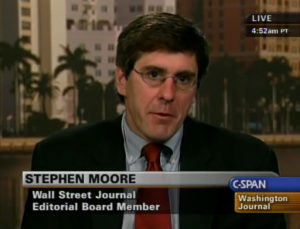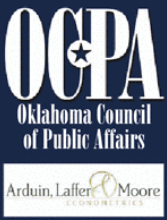A Tip to C&BP Reveals an Editorial Writer’s Financial Ties Were Undisclosed When He Wrote About an Oklahoma Tax Issue
Should a staff editorial writer for a major national newspaper pen a series of editorials favoring an issue just a few months after his consulting firm wrote a study for a client promoting that same viewpoint? The Wall Street Journal says that never happened. But the facts seem to show otherwise.
Some time ago, we received a tip from an Oklahoma state official about Stephen Moore and his work on The Wall Street Journal’s editorial page.
The Oklahoma official wrote:
“The following information is being provided because of failed attempts to elicit a response from the Wall Street Journal concerning what appears to be a disregard for journalistic ethics.
“The econometric firm of Arduin, Laffer & Moore was retained [in 2011] by the Oklahoma Council of Public Affairs (OCPA) to create a report calling for elimination of the Oklahoma personal income tax. Throughout the discussion, Stephen Moore, a partner in the firm, has used his position as a Wall Street Journal columnist and editorial board member to advocate for the position his firm was hired to promote.
“The Wall Street Journal has never disclosed the ties Mr. Moore has with the firm and the ongoing tax policy debate.”
We were prompted to re-examine this tip when the Trump Administration recently floated Moore for membership on the Federal Reserve Board. Although Moore has dropped from the news after revelations of unpaid federal taxes and offensive remarks about women, we thought the tip raised important questions about ethics at the WSJ Editorial Board.
Here’s What We Know
 Stephen Moore’s partnership, Arduin Laffer And Moore Econometrics LLC, was founded in 2005. That same year, Moore began working for the WSJ editorial page as one of its staff writers. C-SPAN archives show appearances by Moore, identified as a member of the WSJ Editorial Board, from 2006 through 2012 and beyond.
Stephen Moore’s partnership, Arduin Laffer And Moore Econometrics LLC, was founded in 2005. That same year, Moore began working for the WSJ editorial page as one of its staff writers. C-SPAN archives show appearances by Moore, identified as a member of the WSJ Editorial Board, from 2006 through 2012 and beyond.
 According to a staffer at Moore’s firm, Joe Sirchio, the partners had a falling out and the company abruptly dissolved in October 2011. The following month, the Oklahoma tax study, “Eliminating the State Income Tax in Oklahoma: An Economic Assessment,” was issued by the client. It was branded with Moore’s name as one of the three partners.
According to a staffer at Moore’s firm, Joe Sirchio, the partners had a falling out and the company abruptly dissolved in October 2011. The following month, the Oklahoma tax study, “Eliminating the State Income Tax in Oklahoma: An Economic Assessment,” was issued by the client. It was branded with Moore’s name as one of the three partners.
Moore Pens Editorials About Oklahoma
Mr. Moore, who was senior economics writer for the Journal’s editorial board, then wrote a series of editorials about the Oklahoma tax issue:
- February 8, 2012, The Heartland Tax Rebellion, unsigned editorial.
- May 15, 2012, Oklahoma Reform Showdown, unsigned editorial.
- May 16, 2012, GOP vs. GOP in Kansas Tax Row, column by Mr. Moore.
- May 29, 2012, Oklahoma GOP KO’s Tax Cut, column by Moore.
- August 22, 2012, Tax Cut Talk in Oklahoma, column by Moore.
The Journal’s Response
 We reached out to Emma Moody, WSJ’s Standards & Ethics Editor, to ask the following:
We reached out to Emma Moody, WSJ’s Standards & Ethics Editor, to ask the following:
“Would reporter or a paid editorial writer at the WSJ today be allowed to take consulting fees to author a study, and then a few months later write a series of editorials promoting that position without telling readers?”
Later the same day, we received an email from Dow Jones Senior Director of Communications Steve Severinghaus. Rupert Murdoch’s News Corp. owns Dow Jones. Its flagship publication is The Wall Street Journal.
“[W]e received assurances from Stephen Moore that he had severed ties with the firm prior to joining the Journal’s editorial board [emphasis added]. Mr. Moore informed us he had nothing to do with the Oklahoma tax study.”
I explained to Severinghaus and Ms. Moody that Moore’s claim that he “had severed ties with the firm prior to joining the Journal’s editorial board” was not supported by the facts. His partnership, Arduin Laffer And Moore Econometrics LLC, was founded in 2005. That was the same year Moore began serving on the WSJ editorial board. Moore’s statement that “he had nothing to do with the Oklahoma tax study” also appears to be untrue, as he was one of three partners of the firm during the period the study was produced.
In a follow-up question, we asked Moody:
“[W]ould reporter or a paid editorial writer at the WSJ today be allowed to take consulting fees to author a study, and then a few months later write a series of editorials promoting that position without telling readers?”
Severinghaus again responded for Moody:
“The answer to your specific question is ‘No’ and I stand by what I said yesterday.”
Code of Conduct
Severinghaus sent us the Dow Jones Code of Conduct. Under the section “Business Relationships and Activities,” the Code states:
“Conversely, Dow Jones employees should not solicit or accept, directly or indirectly, any payment, loan, service, equipment, or any other benefit or thing of value, or any gift, entertainment, or reimbursement of expenses of more than nominal value or that exceeds customary courtesies for that time and place from suppliers or customers, or from any company, individual, or institution that furnishes or seeks to furnish news, information, material, equipment, supplies, or services to Dow Jones, or from anyone else with an actual or prospective business relationship with Dow Jones.”
Let’s unpack that statement: employees should not accept any payment or anything of value from any company that furnishes information to anyone with an actual business relationship with Dow Jones.
Didn’t that apply to Moore, a senior economics writer on the WSJ’s editorial board?
The Dow Jones Code of Conduct was revised only two months after the Arduin, Laffer & Moore study was issued, in January 2012, and only one month before the first of Oklahoma tax editorials were published.
This is the standard of conduct in place now, and Moore’s conduct clearly fails it as a former employee of the WSJ. It also raises at least three important questions:
- What was the standard of conduct in place, if any, when Moore was double-dipping?
- Who was charged with enforcing those standards, if any?
- Did Moore lie to his employer?
When I pointed out the apparent violation of the Code of Conduct to Severinghaus and Moody, there was no further response. In January 2018, Stephen Moore was named the associate opinion editor of The Washington Times.
Scott Peterson is executive director of Checks and Balances Project, an investigative watchdog that seeks to hold government officials, lobbyists and corporate management accountable to the public. Funding for C&BP is provided by Renew American Prosperity and individual donors.







Recent Comments